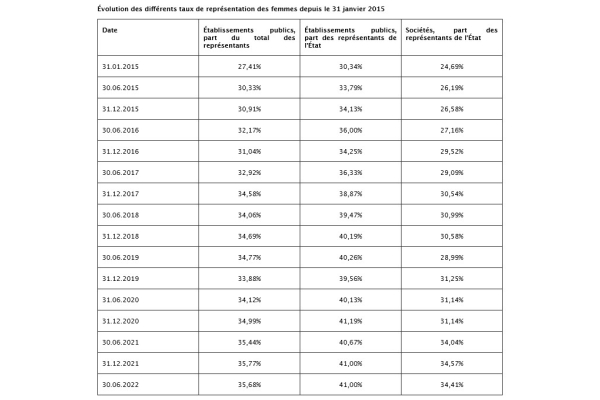
On Friday 30 September 2022, the Council of Government analysed the interim reports concerning better representation of women in the decision-making bodies of public establishments and companies (listed and unlisted on the stock exchange) in which the Luxembourg State holds interests or participations.
The report shows that the collective effort of all the actors involved must continue to reach the overall threshold of 40% representation of women. Currently only the rate of women representing the State in the boards of directors of public establishments exceeds 40%.
Since 2014, the Ministry of the Economy has implemented monitoring of the evolution of the situation. Evolution of the different rates of representation of women since 31 January 2015 in the table (above).
As of 31 December 2021, the total rate of women on the boards of directors of public establishments was 35.77% and as of 30 June 2022 was 35.68%. The report recalled that during the first census dated 31 January 2015, the same rate was 27.41%. There is therefore an evolution of 8.27% in the space of 7.5 years in terms of the total number of representatives.
As of 30 June 2022, the rate of women representing the State on the boards of directors of public establishments was 41% compared to 40.67% a year ago and 30.34% as of 31 January 2015, i.e. an increase of 10.33% over 7.5 years.
At the level of private companies, the rate of women representing the State increased to 34.41% as of 30 June 2022 against 24.69% as of 31 January 2015, i.e. an increase of 9.72% over 7.5 years.
Since mid-2020, the rate of women representing the State in public establishments has stabilised above 40% while it has continued to increase slightly in private companies.
The State currently holds 300 of the 398 seats on the boards of directors of 45 public establishments and 186 of the 363 seats in 36 private companies. Thus, to achieve the objectives set by the government programme, seventeen additional mandates (out of a total of 398 mandates) will have to be held by women on the boards of directors of public establishments and ten additional mandates (out of a total of 186 mandates) in private companies.
Minister of Equality between Women and Men, Taina Bofferding, said: “Women's participation in decision-making processes within companies is the central challenge for equality in the world of work. It is commendable that the State sets an example and ensures permanent monitoring, but this challenge can only be met if the social partners follow this example and make additional efforts. Only collectively can we meet this challenge in the future.”
Minister of the Economy, Franz Fayot, added: “It is undeniable that diversity and therefore the presence of more women on boards of directors is beneficial and essential. It is important that the State lead by example. Even if we can be pleased that the efforts undertaken by the State in favour of equality between women and men are generally bearing fruit, it is essential to stay the course and jointly pursue our efforts. Also, I appeal to all the actors concerned in this sense."








